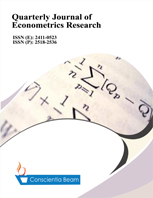Assessment of Mental Health of Undergraduate Students Based on Age: A Bayesian Ordinal Quantile Regression Approach
DOI:
https://doi.org/10.18488/journal.88.2020.61.12.17Abstract
The traditional frequentist quantile regression makes minimal assumptions that accommodate errors that are not normal given that the response variable (y) is continuous even in Bayesian framework. However inference on these models where y is not continuous proves to be challenging particularly when the response variable is an ordinal data. This paper portrays the idea of Bayesian quantile estimation on ordinal data. This method utilizes the latent variable inferential framework. Estimation was done using Markov chain Monte Carlo simulation with Gibbs sampler where the cut points were set ahead of time and remained fixed all through the analysis. The method was applied in a mental health study of University undergraduate students. Investigations of the model exemplify the practical utility of Bayesian ordinal quantile models. In this paper we were able to investigate the mental health state of undergraduate students at different points in the distribution of their ages. Our findings show that the age of the students has a significant effect on their mental health. The results revealed that at 25th, 50th and 75th quantiles the ages had a negative effect on their mental health while at the 95th quantile the effect was positive. This study was able to show that older undergraduate students are more mentally equipped to withstand the stress of higher learning in the University.

